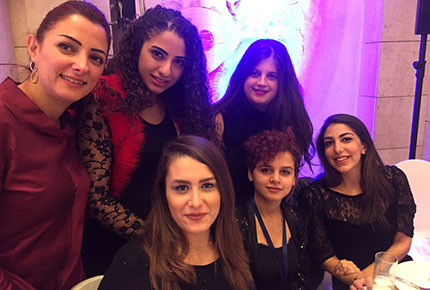LAU and ARIJ team up to empower future journalists
Since LAU signed a memorandum of understanding with Arab Reporters for Investigative Journalism, journalism students have been more inspired than ever.
Journalism majors are always itching to get out of the classroom and start reporting, fully aware that while learning in the classroom is essential, the ultimate experience lies both on and off campus. For six LAU journalism students, this came true last December at the Arab Reporters for Investigative Journalism (ARIJ) three-day conference in Amman, Jordan, where they mingled with professional journalists from across the region and the globe, and attended a series of seminars, workshops and film screenings on various topics in investigative journalism.
The trip took place within the framework of a memorandum of understanding signed between LAU and ARIJ in 2014 which led to the implementation of a curriculum for LAU’s Investigative Journalism class developed by renowned journalist and academic Mark Lee Hunter.
The students, who were selected randomly to attend the conference, traveled with LAU instructor and ARIJ media coach and trainer Bissane El-Cheikh. The seasoned journalist and editor of Al-Hayat said, “I wanted them to mingle with professional journalists to see how it [investigative journalism] is done.” The conference, she believes, was exceedingly beneficial to the eager students who were inspired to take their reporting and writing to a whole new level. As an example, El-Cheikh stated proudly, two of her students, Rana Bou Saada and Hala Nasreddine, published an investigative piece on Global Young Voices about “disabilities laws that are not being implemented in Lebanon.”
LAU senior, Dania Hawat, due to graduate this summer with a B.A. in communication arts with an emphasis on journalism, described the conference as “inspiring,” and said it was critical for future students to attend such events. “Three workshops would happen simultaneously, so [to make the most of it] we decided to have two students attend one workshop. That way, we could share notes and have greater access to information.”
For fellow senior Safa Hamzeh the “workshops supplemented class material very well.” Subsequently, she submitted an investigative piece on torture as her final project to El-Cheikh, who found it “very impressive.”
ARIJ’s current chairman, LAU Assistant Professor in journalism and media studies Yasmine Dabbous, expressed her enthusiasm at the students’ and instructor’s feedback. But why is investigative journalism so important for future writers in Lebanon and in the Middle East? “When investigative journalism flourishes, we move from dependent, lapdog journalism to a watchdog press,” she said.
More
Latest Stories
- LAU Engages High Schoolers With Creative Expression and Scholarship Awards
- How Does Digital Media Impact Our Brain?
- Community Development Takes Root at Capstone Presentation Day
- LAU Athletes Return Victorious from Athens and Belgrade
- A New Initiative Toward Harnessing Digital Transformation
- A Cardiovascular Conference to Streamline National Expertise
- Aspiring Engineers Compete for Scholarships at LAU
- The School of Engineering Delivers Immersive Learning Experiences


